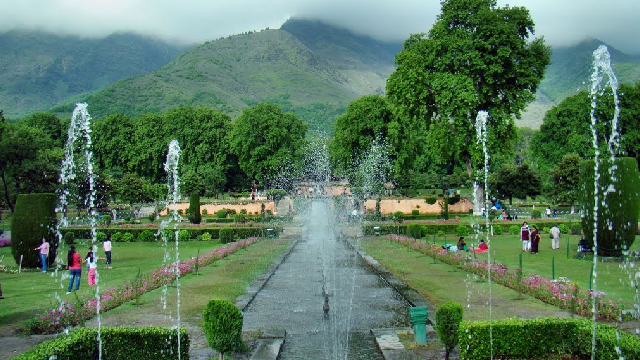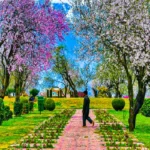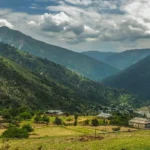Table of Contents
Toggle- Overview
- Nishat Bagh: A Mughal Legacy
- The Architecture and Design of Nishat Bagh
- Flora and Fauna: A Celebration of Nature
- Best Time to Visit Nishat Bagh
- How to Reach Nishat Bagh
- Things to Do at Nishat Bagh
- Nearby Attractions
- Conclusion
- How to book Nishat Bagh tour online?
- Frequently Asked Questions
- Inquiry Form
Overview
Distinguished for its most magnificent landscapes and historic treasures, Kashmir is ‘Paradise on Earth’. Among the several gems of the Kashmir Valley, the Nishat Bagh stands out as one of the most beautiful and culturally significant gardens of the region. This serene beauty, historical importance, and architectural grandeur of Nishat Bagh attract thousands of visitors each year, making it one of Srinagar’s most iconic landmarks.
Nishat Bagh was more a full-fledged expression of Mughal splendour than a garden on the eastern shore of Dal Lake. The very meaning of its name – “Garden of Joy” – epitomizes the delicate and serene essence in which the visitor feels while going about its lushly green pathways. This historical garden unravels the glory of the Mughal Empire along with the impact that it had on the Kashmiri culture and architecture over its colorful flowers, cascading fountains, and lush greenery.
Nishat Bagh Kashmir history, beauty, significance, and attractions. This includes its Mughal origin to grandeur that stands today; we will embed all aspects of the garden, which makes this destination a must-visit for travelers in Srinagar.
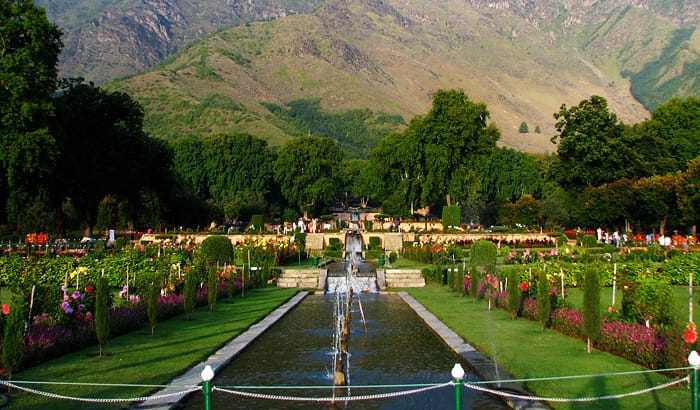
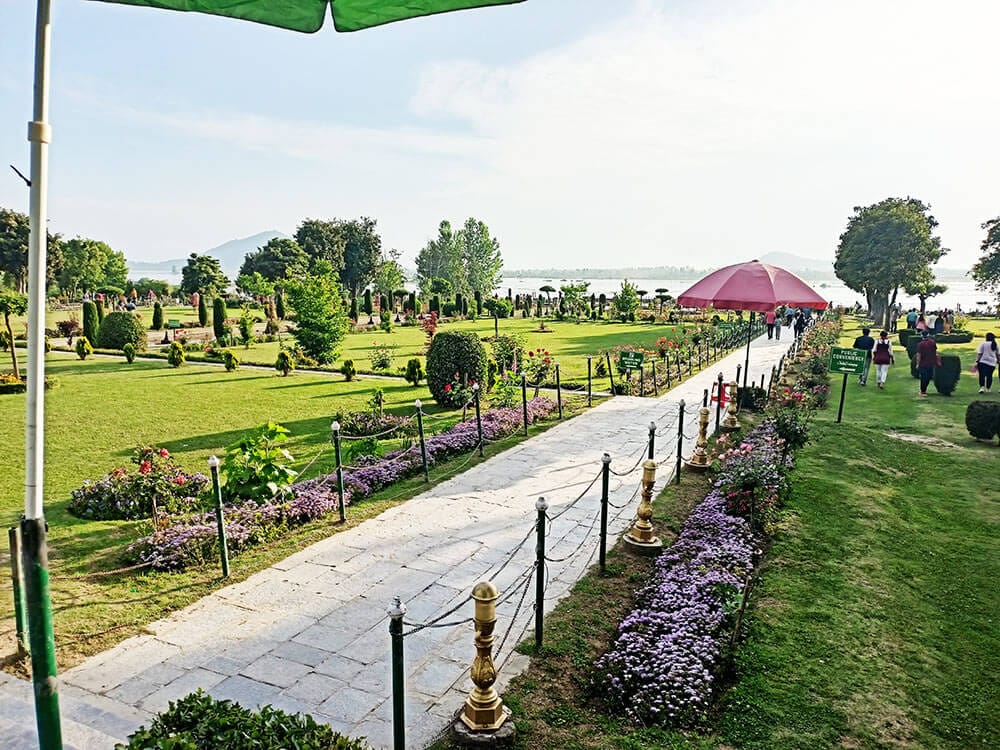
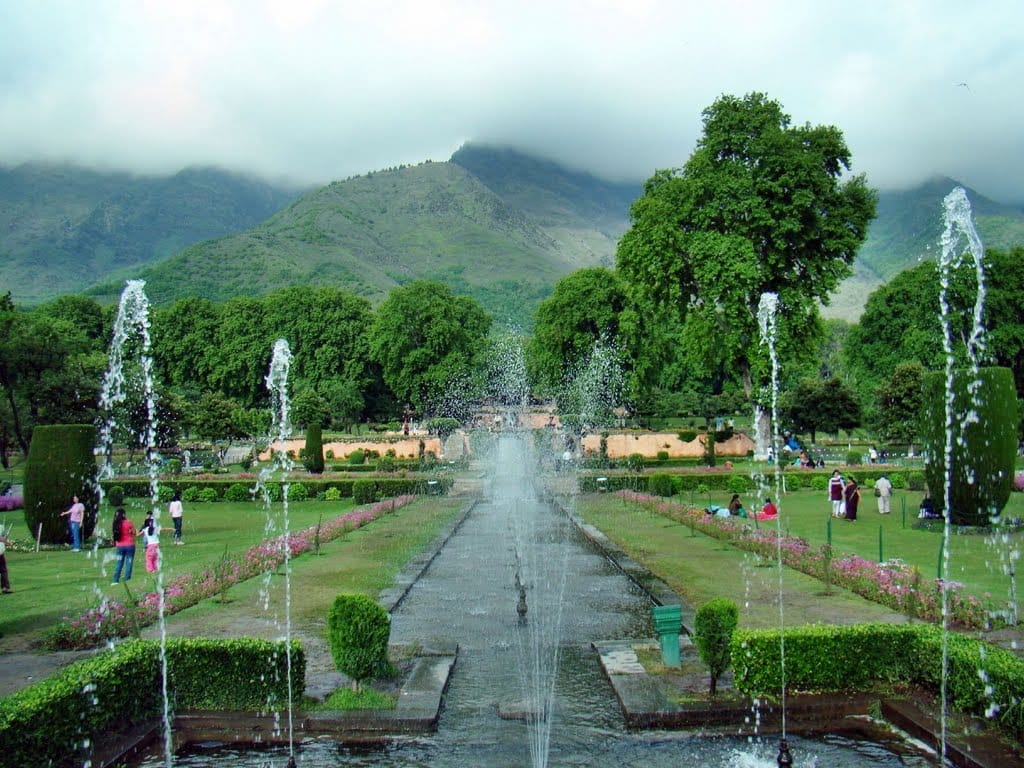
Nishat Bagh: A Mughal Legacy
Nishat Bagh was built by Asif Khan, who just so was the brother of Empress Noor Jahan and also the father of the celebrated Mughal emperor, Dara Shikoh. Asif Khan was a celebrity in the Mughal court of Emperor Jahangir. He wanted to have a garden that would be juxtaposed with the beauty of other Mughal gardens like Shalimar Bagh and Chashme Shahi. The construction took place in 1633 and was completed in 1641, and it was one of the grand examples of the excellence achieved in horticulture and architecture of the Mughals.
Nishat Bagh was constructed based on an ancient Persian-style garden design that outlines the principle of symmetry, water channels, and juxtaposition of beauty of nature with human art. The land had been divided into a terraced garden accompanied with running fountains and pools, with maximum beauty effect by channeling. This is typical in the Mughal architecture of the garden, inspired by the Persian concept of paradise, intent in bringing quiet and a still space in such an environment brought about by the union of the elements of water and earth along with its shadow.
Probably the most striking characteristic that sets Nishat Bagh apart is its location on the Dal Lake’s eastern side, while from itself and the ranges of the Zabarwan in the backdrop, breathtaking sights of the lake can be seen. The orchestrated design of this garden combined with the above-natural elements offer an unmatched beauty to anyone’s senses.
The Architecture and Design of Nishat Bagh
Nishat Bagh, in short, is an ideal synthesis of Mughal and Persian design principles. The garden occupies nearly 12 hectares with six stepped terraces-for this reason, it was specifically designed to offset the natural slope of the locality. These terraces also allowed the viewer a view of the lake and the mountains surrounding that stratified level.
The most very typical feature of a Mughal garden is to have a monumental stone gateway on which lies the entrance. This entrance opens into the first level with a very large spread lawn surrounded by well-manicured flowerbeds. The main attraction of this garden is the long central channel running through its very middle in the form of the “Shahi Canal”. The canal is also interspersed with fountains and water basins. It makes the whole garden full of sounds that give the soothing feeling.
This design of fountains and water channels permits the continuous circulation of water from the topmost to the lower terraces. It draws an analogy with flow of life and eternal movement of water. Water here symbolizes life and purification for the garden; this is because the Mughal emperors believed that the flowing water in the garden symbolized the running stream of life in heaven.
All the terraces of Nishat Bagh have distinct features of their own. The topmost one is known as the “royal terrace,” which offers the best views in the garden. It overlooks the entire garden and even Dal Lake, besides its mountains surrounding it. All the terraces have pavilions, water features, and shaded walkways which provide cool shelters when the summer sun becomes unbearable.
Mughal-style chhatris or domed pavilions have created a beautiful addition to the architecture throughout the garden. They were built as resting places for the royal family members so that they can sit and enjoy the beauty of the garden and cool breeze from the lake.
Flora and Fauna: A Celebration of Nature
The beauty of Nishat Bagh lies not only in its architecture but also in the variety of plant lives. This garden has varieties of flowers, shrubs, and trees blooming at different times in the seasons. Main attractions in this garden include cherry blossoms and tulips, which bloom during spring, and provide one with a kaleidoscope of colors. The long warm days of summer come along with roses, jasmine, and lilies, which add even more glory to the beauty of the garden.
The garden also has many fruit trees-apricots, apples, and pomegranates-created that typical rustic charm of the garden. With all those plants with the fragrant scents of flowers like chamomile and lavender, Nishat Bagh is, in actuality, an aromatic paradise.
Along with these species, innumerable types of birds can also be seen on the treetops and moving through the water channels, such as Indian mynas, bulbuls, and cuckoos. The beauty and beauty added by these birds make the calm garden even more vibrant.
Best Time to Visit Nishat Bagh
Nishat Bagh is open throughout the year; however, spring and summer (March to August) are the best times for a visit to the garden, as it marks the period of the flowering of flowers, which makes the climate incredibly excellent for strolls over the vast lawns here. As a side, it’s a very fresh spot for sightseeing, also because of the cool breezes coming from Dal Lake and the flowers blooming at every step.
Actually, autumn (from September to November) is also quite a magic time to visit the garden. The rapidly cooling air, along with the color change of leaves, creates a magical atmosphere in shades of red, yellow, and orange adorning the trees. It is quite a different experience altogether, for during winter months (from December to February) the snow layer often covers the garden. It has its charming serenity and quiet even if some of the fountains freeze and with the characteristic snow-covered landscape, in the distance, the view of the Zabarwan Range.
How to Reach Nishat Bagh
Nishat Bagh is reachable from Srinagar city, connected with roads, rails, and air with other parts of the country of India. Here are the best ways to reach Nishat Bagh:
i. By Air: The nearest airport is Sheikh ul-Alam International Airport, Srinagar 25 km away from this garden. From here, Taxis and other local transports available which can reach to the garden Nishat Bagh.
ii. By Road: Srinagar has all the major road links to other cities of the state and neighboring states. It is very easy to hire a taxi or catch a bus to reach Nishat Bagh. The eastern shore of Dal Lake has the road access to it, making it accessible by road.
iii. Local Transport: You may even hire a shikara-the traditional boat that will take you to the location of Nishat Bagh. Rides on boat along Dal Lake are simply beautiful and unique ways to reach the gardens where you can witness the beauty of the lake and mountains.
Things to Do at Nishat Bagh
Nishat Bagh is more than just a venue to watch flowers and fountains; it also offers an array of activities that one might enjoy on its visit to the garden. The top things to do while visiting the garden include the following:
1. Walk through the Terraces
Nishat Bagh has six terraces, and since it boasts of something different at each level, from a waterfront view of the lake to artistically laid flowerbeds, fun and frolic abound. The panoramic view atop bears up to great photographic opportunity because it presents just such a view of the garden, Dal Lake, and the Zabarwan Range.
2. Photography and Scenic Views
The beauty that the Nishat Bagh has for photographers is when pictures can be taken in umpteenth numbers of the beauty from the garden through water channels, fountains, and the landscapes around. The golden hour, before sunset, would be just perfect for clicking photographs of flowers in full bloom and the serene serenity of the garden.
3. Shikara Ride to Dal Lake
The ride in shikara is one of the gorgeous ways through which Nishat Bagh can be viewed. The concept of a boat ride does not only provide a different view of the garden but also enjoys the scenic beauty of the lake and mountains. Shikara ride is, therefore, especially soothing in early morning or evening hours.
4. Sit back and Enjoy the Serene Surrounds
While being in the serene surroundings, Nishat Bagh is an ideal place where you can sit back and relax. This pretty garden presents an excellent opportunity for a leisurely stroll, resting in the shaded pavilions, or merely absorbing the beauty of flowing water and fragrance of flowers.
5. Know the History of Mughals
Nishat Bagh is not only a beautiful garden but also glorifies the glory of the Mughal Empire. Much about its history and how the garden came into creation can be learned by visitors by contacting local guides or even through any information boards in place; it has also played an important role in Kashmiri culture.
Nearby Attractions
i. Shalimar Bagh: It is another beautiful garden of the Mughal era and is close to Nishat Bagh with the mesmerizing view of Dal Lake .
ii. Dal Lake: It has the famous shikara of Srinagar; take a ride on it.
iii. Hazratbal Shrine: This religious shrine is of great importance, situated on the northern banks of Dal Lake.
iv. Shankaracharya Temple: This is a very old temple at hill top; for a view of Srinagar and Dal Lake this should never be missed.
Conclusion
Nishat Bagh is not another garden, it is proof of the glorious presence of Mughal architecture combined with the natural beauty of Kashmir, right from marvelous terraces to falling fountains and heavenly sights of Dal Lake in combination with the Zabarwan Range-Nishat Bagh offers a serene and unforgettable experience. Whether you are an admirer of history, nature, or you just need to find solace in your stressed busy schedule, a visit to Nishat Bagh will leave everything captivated and rejuvenated.
Nishat Bagh is one of the greatest landmarks in Kashmir as well as in Srinagar city. It is cherished because of its rich historical backgrounds, majesty in architecture, and the beauty of its surroundings.
How to book Nishat Bagh tour online?
Contact Brown Chinar at +91 6005039532/+91 9906188874 or Email us at brownchinartourtravels@gmail.com
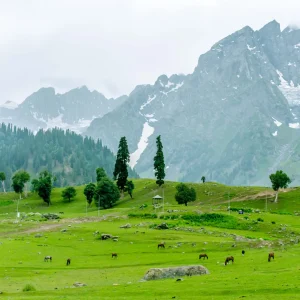
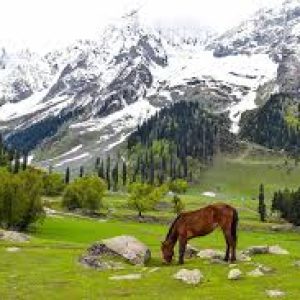
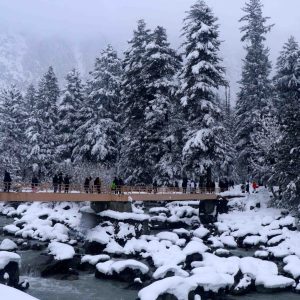
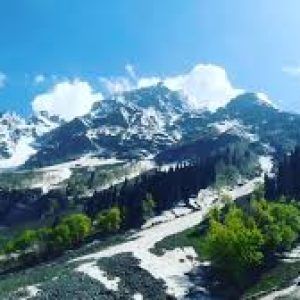
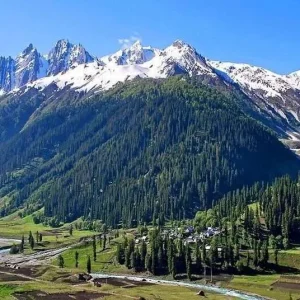
Frequently Asked Questions
| 1. What is Nishat Bagh? |
| Nishat Bagh is one of the most famous Mughal gardens located on the eastern side of Dal Lake in Srinagar, Kashmir. Known for its beautiful terraced layout, it is the largest Mughal garden in Kashmir and a prime example of Mughal horticultural artistry. |
| 2. Where is Nishat Bagh located? |
| Nishat Bagh is located on the banks of Dal Lake in Srinagar, Jammu & Kashmir, India. It is about 12 km from Srinagar’s city center and easily accessible by road. |
| 3. When was Nishat Bagh built? |
| Nishat Bagh was built in 1633 by Asif Khan, the elder brother of Empress Noor Jahan, during the reign of Mughal Emperor Shah Jahan. It is one of the six Mughal gardens built in Kashmir. |
| 4. What makes Nishat Bagh special? |
| Nishat Bagh is renowned for its terraced layout, symmetrical design, cascading fountains, and beautiful flower beds. The garden offers stunning views of Dal Lake and the surrounding mountains, making it a popular tourist spot. |
| 5. What does the name ‘Nishat Bagh’ mean? |
| The name “Nishat Bagh” translates to “Garden of Joy” or “Garden of Delight” in Persian, reflecting the peaceful and joyful ambiance of the garden. |
| 6. What is the best time to visit Nishat Bagh? |
| The best time to visit Nishat Bagh is during the spring (March to May) and summer (June to August) months when the flowers are in full bloom. Autumn (September to November) is also a good time to visit for beautiful foliage. |
| 7. Is there an entry fee for Nishat Bagh? |
| Yes, there is a nominal entry fee for visiting Nishat Bagh. The fee may vary for foreign tourists and Indian nationals. As of now, Indian nationals may pay around 竄ケ20, while foreign nationals may pay 竄ケ100 or more. |
| 8. What are the opening hours of Nishat Bagh? |
| Nishat Bagh is generally open from 9:00 AM to 7:00 PM daily, including weekends. It is advised to visit early in the morning or late afternoon for a more serene experience. |
| 9. Can I take photographs in Nishat Bagh? |
| Yes, photography is allowed in Nishat Bagh. The beautiful scenery, fountains, and historical architecture provide excellent photo opportunities. However, professional photography may require prior permission. |
| 10. Is Nishat Bagh accessible for disabled visitors? |
| Yes, Nishat Bagh is relatively accessible for disabled visitors, with smooth paths for easy navigation. However, the garden’s large size may require assistance for certain areas, especially the terraced levels. |
| 11. Are there any nearby attractions to Nishat Bagh? |
| Yes, there are several attractions near Nishat Bagh, including: |
| Shalimar Bagh: Another famous Mughal garden. |
| Dal Lake: The iconic lake where you can enjoy a shikara ride. |
| Shankaracharya Temple: Situated on a hilltop, offering panoramic views of Srinagar. |
| Hazratbal Shrine: A revered Muslim shrine located near Dal Lake. |
| 12. How do I reach Nishat Bagh from Srinagar city center? |
| Nishat Bagh is about 12 km from the Srinagar city center (Lal Chowk). You can reach the garden by taxi, auto-rickshaw, or even take a bus from the city. Alternatively, you can hire a private vehicle or use a local transport service. |
| 13. Is Nishat Bagh a good spot for a picnic? |
| Yes, Nishat Bagh is a popular picnic spot. The lush greenery, fountains, and beautiful surroundings make it a great place to relax, have a picnic, or enjoy a leisurely walk with family or friends. |
| 14. What are the main features of Nishat Bagh? |
| Key features of Nishat Bagh include: |
| A terraced layout with 12 terraces representing the 12 zodiac signs. |
| Water channels and cascading fountains. |
| Spectacular views of Dal Lake and the Zabarwan Range. |
| Beautiful flower beds and lush green lawns. |
| 15. What is the historical significance of Nishat Bagh? |
| Nishat Bagh was constructed as a symbol of Mughal grandeur and is one of the best examples of Mughal gardening techniques. The garden also holds cultural and historical significance as it was built by Asif Khan, a powerful minister in the Mughal empire. |
| 16. Is there any local food available near Nishat Bagh? |
| Yes, there are several local food vendors and eateries near Nishat Bagh where you can try Kashmiri delicacies like Rogan Josh, Yakhni, Saffron Kehwa, and Gushtaba. You can also find small shops selling local snacks and sweets. |
| 17. Can I rent a shikara near Nishat Bagh? |
| Yes, you can rent a shikara near Nishat Bagh to enjoy a peaceful ride on Dal Lake. The lake offers scenic views of the gardens and surrounding mountains, making for a serene and memorable experience. |
| 18. Is Nishat Bagh a good place for photography? |
| Yes, Nishat Bagh is an excellent location for photography. The beautifully manicured gardens, fountains, and stunning views of Dal Lake make it a perfect place for both amateur and professional photographers. |
| 19. Can I visit Nishat Bagh during winter? |
| Yes, Nishat Bagh can be visited during winter. While the garden may not be in full bloom, the snow-covered landscape provides a different kind of beauty, and the surrounding mountains look majestic during this time. |
| 20. What is the size of Nishat Bagh? |
| Nishat Bagh spans over an area of around 12 acres. It is one of the largest Mughal gardens in Kashmir and is spread across a series of terraced levels with water channels and fountains. |
| 21. What is the architectural style of Nishat Bagh? |
| Nishat Bagh follows the traditional Mughal garden design, with a symmetrical layout, terraced levels, water channels, and lush green lawns. The garden also features Persian influences, with the use of water as a central element. |
| 22. Are there any festivals or events held at Nishat Bagh? |
| Though not a major site for festivals, Nishat Bagh is often visited during the spring bloom and other seasons for its natural beauty. Special cultural programs and exhibitions may be held in the surrounding areas of Srinagar, especially during the tourism season. |
| 23. Is there parking available at Nishat Bagh? |
| Yes, there is parking available near the entrance of Nishat Bagh. However, during peak tourist seasons, parking may become crowded, so it’s advisable to arrive early. |
| 24. Is Nishat Bagh crowded with tourists? |
| Yes, Nishat Bagh can get crowded, especially during the peak tourist season in spring and summer when the flowers are in full bloom. If you prefer a quieter experience, visiting early in the morning or late afternoon is recommended. |
| 25. Can I explore Nishat Bagh on my own, or do I need a guide? |
| You can explore Nishat Bagh on your own, as the layout is straightforward and easy to navigate. However, hiring a guide can enrich your experience, as they can share detailed historical and architectural insights about the garden. |

